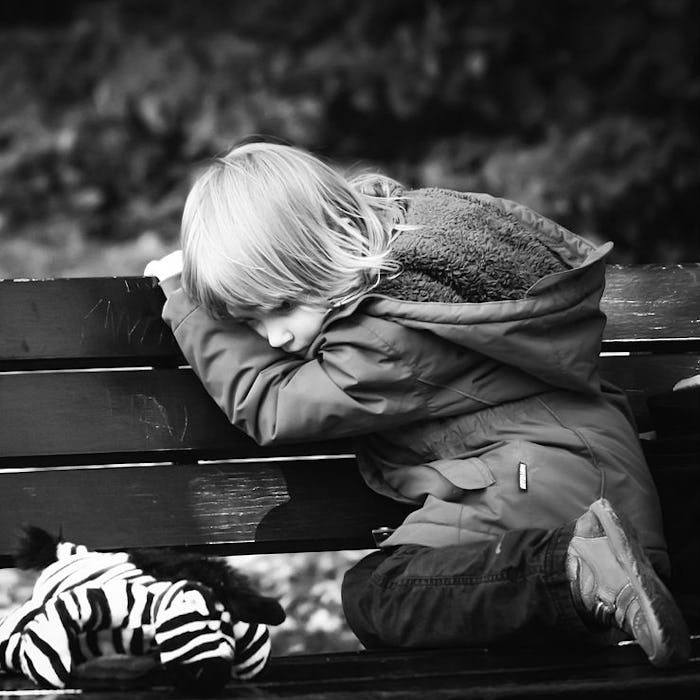When my daughter was just two months old, my husband and I decided to end our marriage. Our divorce wasn’t without heartbreak, but it was an easy decision to make, as it was obvious neither one of us was getting what we needed or wanted out of the marriage. As much as this affected me, my only concern was for my daughter. I spent days scrolling through parenting websites to learn how divorce affects kids and how to make the transition as easy as possible for her. I cried myself to sleep thinking about how my decision was hurting her. I would have done anything, even stayed in a loveless marriage, if meant ensuring my daughter’s happiness. I mean, they say divorce ruins kids, right?
Well, not necessarily. I spoke with John Carton, licensed clinical psychologist and professor of psychology at Oglethorpe University in Atlanta, who assured me that divorce doesn’t destine a child from trouble. “It increases the odds of some problems, but it is just one of many factors that influences our development,” he says. “Divorce is not the only predictor of behavioral problems in children. Ask any clinician if she or he has clients with psychological difficulties, but whose parents are married and generally nice people, and most will raise their hands.”
That’s not to say there won’t be struggles and an adjustment period for your children. Carton explains that children may have difficulties adjusting to the new situation at first, especially if the parents aren’t on the same page when it comes to rules and routine. This stress may cause children to develop a behavioral problem, but Carton assures they are often temporary. He adds that if parents are able to keep things cordial and provide a stable, loving environment for their children, most of these issues can be minimized. And for those who think staying together for the child’s sake is best, Carton feels that does more harm than good.
“Intact families can have more stress than divorced ones, contributing to problems in their children,” he says. “It would be short-sighted to infer that divorce is always ‘bad’ and staying together is always ‘good’ for the children.”
Still this doesn’t make the decision to divorce any easier on your child. Here are three tips to help your child through this life-changing event.
1. Let Your Child Talk
It can be difficult to hear, but if your child has something to say about you, your ex, or the divorce, you should let them speak. Allowing your child to be angry and vent about the situation lets them know that you’re willing to listen, regardless of how it makes you feel. They didn’t put themselves in this situation, and they need to know it’s OK to be mad or upset.
Try To Keep Similar Schedules Between Homes
Co-parenting doesn’t just mean getting along with your ex. It also means working together to provide a stable, healthy environment for your children. That means no fluctuation of rules between parents. With my daughter, my ex agreed to follow her dinner, bath, and bedtime routine when she is with him to minimize the chances of her having a difficult time away from me.
Keep The Peace
There are going to be days where the last thing you want to do is smile warmly at your ex and ask them how you’re doing, but you’re going to have to for your kids. No matter how old your child is, they can sense anxiety and tension, which can affect their behavior. Working together with your ex-spouse is your best defense against divorce negatively affecting your child. But, as Carton points out, sometimes this is easier said than done. “In some cases, the parents are unlikely to be able to pull off that level of agreement.” he explains. “The simple fact that they are divorced would suggest difficulty in working together,” Carton explains
Present A United Front
Children thrive when they have boundaries and rules, so keeping a united front with your ex is essential to making your child’s transition into a divorced family easy. By keeping similar rules at each house and using the same discipline, your kids will realize that even though their parents aren’t together, they’ll still work as a team.
Consider Your Child’s Wishes
You know what’s best for your child, but listening to their desires and giving them some thought can go a long way in creating a comfortable environment. If your child wishes to spend every Wednesday evening with their other parent, listen to their reasoning. If you think it’s beneficial and good for your child, tell them you think that’s a great idea. When your children know that you’ll listen to their wants, they know they come first, regardless of your own feelings.
Be Flexible
Divorce isn’t easy on anyone and refusing to be flexible can make it harder. There may come a week when your ex needs to switch visitation days with you or you need them to pick your child up instead of you dropping off. If you’re willing to roll with the punches and keep a stable environment, your child will notice.
Again, these are only some ways to make the separation easier on your child. And for some people, they may not work. Over 1.5 million children suffer through their parents’ divorce each year, and each one has to find it’s own way to navigate the new normal. Remember that your child is not alone in this. And neither are you.
Images: U.S. Fotografie/Flickr; Giphy (6)
